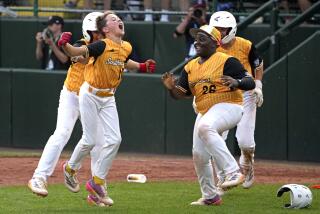Why take girls out of the game?
- Share via
IF YOU’RE A baseball fan, you should know what took place Aug. 1-6. Eighteen American baseball players flew to Taipei, Taiwan, as the best women’s team in the United States -- and returned to Los Angeles as the best women’s team in the world.
You didn’t know that? The Japanese media covered the tournament, held at Tienmu Baseball Stadium, that included teams from Canada, Australia, Taiwan, Hong Kong, Japan, Cuba and the U.S. But there was no ESPN booth, no U.S. reporters, and it was difficult to find news of the games even online, which probably explains why you missed hearing about the tournament. What a shame.
This year’s U.S. team fielded some returning veterans from the inaugural 2004 team that competed in Edmonton, Canada. It included members of the Colorado Silver Bullets professional team of 1994-97. The team’s two youngest members are 15 years old, and the oldest will be 40 this year. The team was coached by Julie Croteau, the first woman to play on a men’s NCAA baseball team (St. Mary’s College of Maryland) and the first woman to coach a men’s Division I baseball team (University of Massachusetts). Now she is the first female manager to win a gold medal at the Women’s World Cup Tournament.
My 18-year-old daughter, Lilly Jacobson, was a member of Team USA. She was selected after a three-stage national tryout. Neither of us had ever heard of a national women’s baseball team -- or of any organized women’s baseball in the U.S. -- until research for a book I’m writing led me to Jim Glennie, president of the American Women’s Baseball Federation. When he learned that Lilly played high school ball, he invited her to try out for the team.
Lilly has played baseball with boys all her life, right through high school. After she completed Little League, coaches at the next level and parents who thought she shouldn’t squander her athletic talent pressured her to switch to softball. My daughter resisted because she’s good at baseball and loves the skills the sport demands -- fielding agility, base-running savvy and hitting a hard ball. To Lilly, baseball is simply a more exciting, intricate game, with a long and colorful history.
It also promises fame and fortune to boys talented enough to play professionally. Girl players eventually realize they are excluded from that dream.
Still, a few girls play baseball anywhere they can despite tremendous cultural resistance. My daughter switched high schools in our hometown of Reno to escape a coach who told her she wasn’t good enough to play on his team. To protect her from such discrimination, we moved her to a school where the coach encouraged her to play.
The women on Team USA have similar stories to tell. Malaika Underwood, a 25-year-old from San Diego, “interviewed” four high school coaches before she found one who would give her a tryout. Molly McKesson, a Florida 20-year-old, played high school baseball on the same team as her brother, but when he graduated, the coach became, in the words of her mother, “an abusive jerk.” Fifteen-year-old Jennifer Hunter is a gifted pitcher, but her Florida high school insists that she play softball. Jane Uh, also 15 and entering her junior year at a Riverside high school, has had a relatively smooth ride so far. She played junior varsity baseball, is the only girl on a travel-ball team and will try out for the varsity team this year. Her explanation for sticking with baseball is the same as my daughter’s: “Baseball’s better, forget softball.”
Most girl players forget baseball when they move on to college. Lilly is a freshman at Vassar -- and on the golf team. Meggie Meidlinger, the other 18-year-old on Team USA, gained famed last spring after pitching a perfect game against a boys’ team. Sports Illustrated and USA Today chronicled her feat. She is now a freshman at Virginia Tech, unsure of what sport to pursue.
The irony is that the birthplace of baseball is alone in discouraging girls’ and women’s baseball. Japan has a nationwide women’s program, from Little League through college. Most of the members of the Canadian team play together all year. The Australian team had practiced since April. Only the U.S. team had been together for less than a week when the tournament began. Yet, after losing the first game to Canada, Team USA won the next five games to capture the World Cup.
But a troubling question lingers: Is it too frightening to admit that girls can play baseball?
More to Read
Go beyond the scoreboard
Get the latest on L.A.'s teams in the daily Sports Report newsletter.
You may occasionally receive promotional content from the Los Angeles Times.










